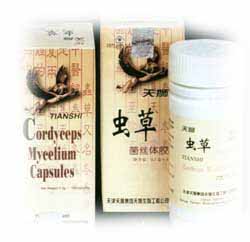An ancient Chinese remedy based on a wild mushroom, aids the fitness of sedentary, middle-aged people. The study was performed as a clinical trial with neither the volunteers nor the researchers knowing who took the remedy and who was given a harmless placebo until the experiment was over. Old Chinese mushrooms pep up the middle-aged
By Steve Connor,
Science EditorFor the 131 volunteers in the trial, there was a significant increase in aerobic fitness when participants took supplements based on fermented extracts of the Chinese cordyceps mushroom, scientists found.
The volunteers were aged between 40 and 70 and they were monitored for lung capacity, breathing, heart rate and blood pressure during and after short bouts of vigorous exercise and endurance walks.
The researchers will present their results this week to the American Physiological Society, saying the study shows the Chinese mushrooms can significantly improve human health and fitness.
The findings support many anecdotal accounts that have attributed health improvements and astounding athletic feats to cordyceps mushrooms or dietary supplements made from them.
In 1993, Chinese women athletes took six out of nine possible medals, including gold in the women's 1,500, 3,000 and 10,000 metres, at the World Championships in Stuttgart, Germany. Their coach attributed the dramatic success to intensive high-altitude training and cordyceps supplements, although others suspected illicit drug use.
Jia-Shi Zhu and James Rippe from a California-based company called Pharmanex said they used a commercial mushroom extract called Cordymax, based on an ancient Chinese recipe using fermented mushrooms. "This study provides scientific evidence that Cordymax is effective in enhancing aerobic exercise capability, endurance exercise performance and exercise metabolism and alleviating fatigue in healthy humans," they say.
"The study employed sports physiology methods, measuring exercise capacity, endurance performance, and exercise-related metabolic alterations before, in the middle of and after the 12-week study treatment with Cordymax."
Herbal remedies made from Chinese mushrooms were said to have started when herdsmen in the Himalayas noticed how the condition of their livestock improved after grazing on mountain-side meadows where the mushrooms grew.
Cordyceps became a mainstay of Chinese herbal medicine, although its expense limited its use, and it has been used to treat other conditions, including male and female infertility, for at least 2,000 years. In China, it is still prescribed as an aphrodisiac and a treatment for the elderly to ease general aches and pains.
Chinese doctors also claim it boosts immunity to infections and can help to fight respiratory illnesses, although there was little to support these claims in the published scientific literature.
Cordyceps sinensis is sometimes called the caterpillar fungus. It is found in isolated, mountainous areas of south-west China, Tibet and Nepal. In China it is called "winter worm, summer grass" because it sometimes "fruits" out of the bodies of dead worms or insects.
Its rarity in the wild has led to a boom in the commercial cultivation of the mushroom for herbal remedies.
Betel nut
Low-fat blues
cacao-chocolate.com
cognitive-enhancers.com
Vitamins and mood
Pharmacogenomics
Docosahexaenoic acid
Catecholamine depletion
Mood, food and cognition
Nutmeg seeds and anxiety
Bad moods and sick hearts
PUFA deficiency and allergies
Refs
HOME
HedWeb
BLTC Research
The Good Drug Guide
Paradise-Engineering
The Hedonistic Imperative
MDMA: Utopian Pharmacology

